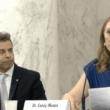Frank von Hippel, professor of public and international affairs emeritus, Program on Science and Global Security, Princeton University
April 2, 2015
The agreement sketched out in the US summary, “Parameters for a Joint Comprehensive Plan of Action,” and in Secretary of State John Kerry’s remarks looks very good. Certainly, it is much better than the “no agreement” option that some US allies in the Middle East and many in Congress called for. A failure to agree would have been a recipe for disaster, a return to the counterpoint of escalating US sanctions and moves by Iran ever closer to a nuclear-weapon capability.
If this deal—including the extra transparency Iran has committed to, and the reciprocal sanctions relief for Iran that the US and its partners have committed to—can be nailed down by the end of June, and both sides live up to their commitments, it could buy us 10 years of relative calm with regard to Iran’s nuclear program, at least.
Some of the constraints on Iran’s nuclear program will phase out after 10 years. It is therefore important that we use those years to create a stronger nonproliferation regime in the Middle East.
One concern is that other countries in the region—notably Egypt, Saudi Arabia and Turkey—will declare that they too have “inalienable rights” to uranium enrichment programs. They probably believe, as I do, that, even if Iran does not want a nuclear bomb, it does want the option of going for a bomb if the United States ever decides to try to achieve “regime change” in Teheran by force. And other countries in the region may want to position themselves to acquire nuclear weapons quickly if Iran does.
So we need to build in additional constraints on Iran’s nuclear program that will reassure its neighbors in the time frame beyond 10 years, when the constraints on the size of Iran’s enrichment program are relaxed.
I believe that former International Atomic Energy Agency director general Mohammed ElBaradei was right when he proposed that all national enrichment programs be phased out in favor of multinational enrichment programs like that of Urenco, which is supervised by Germany, the Netherlands, and the United Kingdom. I hope that it will be possible to multinationalize Iran’s enrichment program. Exactly how this can be done is not yet clear, but one of the partners could be Russia, which already has close ties to Iran’s nuclear program. I would hope also that a regional organization could be created— akin to Euratom or the Brazil-Argentine Agency for Accounting and Control—that would provide additional transparency into Iran’s program for its neighbors.
The negotiators have crafted the beginning of a win-win solution to the confrontation over Iran’s nuclear program. The rest of us need now to mobilize to defend and build on this achievement and strengthen the nonproliferation regime in both the Middle East and worldwide.
Frank von Hippel
senior research physicist and professor of public and international affairs emeritus
Program on Science and Global Security, Princeton University













